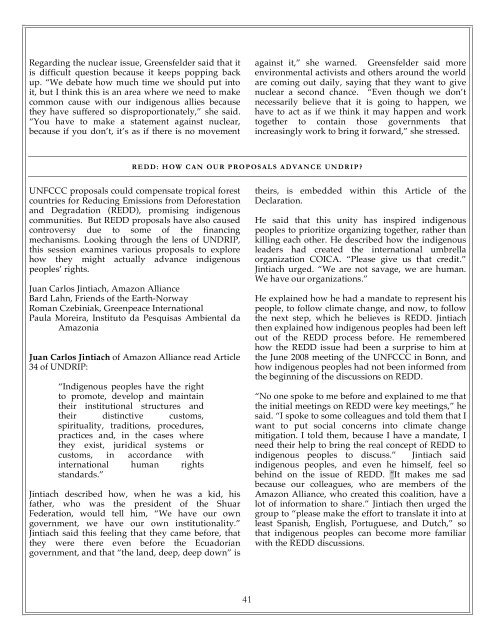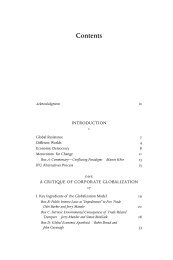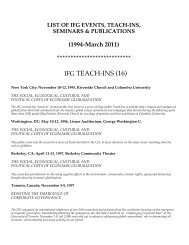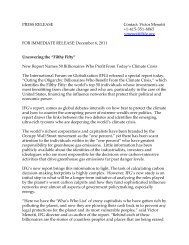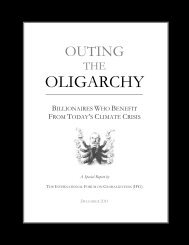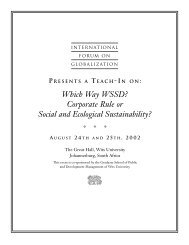UNDRIP Report - English FINAL - International Forum on Globalization
UNDRIP Report - English FINAL - International Forum on Globalization
UNDRIP Report - English FINAL - International Forum on Globalization
You also want an ePaper? Increase the reach of your titles
YUMPU automatically turns print PDFs into web optimized ePapers that Google loves.
Regarding the nuclear issue, Greensfelder said that it<br />
is difficult questi<strong>on</strong> because it keeps popping back<br />
up. “We debate how much time we should put into<br />
it, but I think this is an area where we need to make<br />
comm<strong>on</strong> cause with our indigenous allies because<br />
they have suffered so disproporti<strong>on</strong>ately,” she said.<br />
“You have to make a statement against nuclear,<br />
because if you d<strong>on</strong>’t, it’s as if there is no movement<br />
against it,” she warned. Greensfelder said more<br />
envir<strong>on</strong>mental activists and others around the world<br />
are coming out daily, saying that they want to give<br />
nuclear a sec<strong>on</strong>d chance. “Even though we d<strong>on</strong>’t<br />
necessarily believe that it is going to happen, we<br />
have to act as if we think it may happen and work<br />
together to c<strong>on</strong>tain those governments that<br />
increasingly work to bring it forward,” she stressed.<br />
RE DD: HOW C AN OU R P RO P OS ALS A D VA N C E UN DRIP ?<br />
UNFCCC proposals could compensate tropical forest<br />
countries for Reducing Emissi<strong>on</strong>s from Deforestati<strong>on</strong><br />
and Degradati<strong>on</strong> (REDD), promising indigenous<br />
communities. But REDD proposals have also caused<br />
c<strong>on</strong>troversy due to some of the financing<br />
mechanisms. Looking through the lens of <str<strong>on</strong>g>UNDRIP</str<strong>on</strong>g>,<br />
this sessi<strong>on</strong> examines various proposals to explore<br />
how they might actually advance indigenous<br />
peoples’ rights.<br />
Juan Carlos Jintiach, Amaz<strong>on</strong> Alliance<br />
Bard Lahn, Friends of the Earth-Norway<br />
Roman Czebiniak, Greenpeace <str<strong>on</strong>g>Internati<strong>on</strong>al</str<strong>on</strong>g><br />
Paula Moreira, Instituto da Pesquisas Ambiental da<br />
Amaz<strong>on</strong>ia<br />
Juan Carlos Jintiach of Amaz<strong>on</strong> Alliance read Article<br />
34 of <str<strong>on</strong>g>UNDRIP</str<strong>on</strong>g>:<br />
“Indigenous peoples have the right<br />
to promote, develop and maintain<br />
their instituti<strong>on</strong>al structures and<br />
their distinctive customs,<br />
spirituality, traditi<strong>on</strong>s, procedures,<br />
practices and, in the cases where<br />
they exist, juridical systems or<br />
customs, in accordance with<br />
internati<strong>on</strong>al human rights<br />
standards.”<br />
Jintiach described how, when he was a kid, his<br />
father, who was the president of the Shuar<br />
Federati<strong>on</strong>, would tell him, “We have our own<br />
government, we have our own instituti<strong>on</strong>ality.”<br />
Jintiach said this feeling that they came before, that<br />
they were there even before the Ecuadorian<br />
government, and that “the land, deep, deep down” is<br />
theirs, is embedded within this Article of the<br />
Declarati<strong>on</strong>.<br />
He said that this unity has inspired indigenous<br />
peoples to prioritize organizing together, rather than<br />
killing each other. He described how the indigenous<br />
leaders had created the internati<strong>on</strong>al umbrella<br />
organizati<strong>on</strong> COICA. “Please give us that credit.”<br />
Jintiach urged. “We are not savage, we are human.<br />
We have our organizati<strong>on</strong>s.”<br />
He explained how he had a mandate to represent his<br />
people, to follow climate change, and now, to follow<br />
the next step, which he believes is REDD. Jintiach<br />
then explained how indigenous peoples had been left<br />
out of the REDD process before. He remembered<br />
how the REDD issue had been a surprise to him at<br />
the June 2008 meeting of the UNFCCC in B<strong>on</strong>n, and<br />
how indigenous peoples had not been informed from<br />
the beginning of the discussi<strong>on</strong>s <strong>on</strong> REDD.<br />
“No <strong>on</strong>e spoke to me before and explained to me that<br />
the initial meetings <strong>on</strong> REDD were key meetings,” he<br />
said. “I spoke to some colleagues and told them that I<br />
want to put social c<strong>on</strong>cerns into climate change<br />
mitigati<strong>on</strong>. I told them, because I have a mandate, I<br />
need their help to bring the real c<strong>on</strong>cept of REDD to<br />
indigenous peoples to discuss.” Jintiach said<br />
indigenous peoples, and even he himself, feel so<br />
behind <strong>on</strong> the issue of REDD. “It makes me sad<br />
because our colleagues, who are members of the<br />
Amaz<strong>on</strong> Alliance, who created this coaliti<strong>on</strong>, have a<br />
lot of informati<strong>on</strong> to share.” Jintiach then urged the<br />
group to “please make the effort to translate it into at<br />
least Spanish, <str<strong>on</strong>g>English</str<strong>on</strong>g>, Portuguese, and Dutch,” so<br />
that indigenous peoples can become more familiar<br />
with the REDD discussi<strong>on</strong>s.<br />
41


